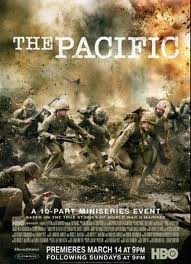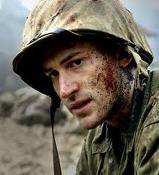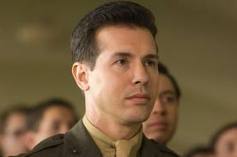1941年12月7日,日军袭击珍珠港,一直置身事外的美国被卷入第二次世界大战。为了取得海上主动权,美国派出军队在太平洋战场迎击日军——海军陆战队登陆瓜达尔卡纳尔岛,打响了三年海岛血战的第一炮……
2010年3月,耗资2.23亿美元的迷你剧《太平洋战争》在万千粉丝的期待中正式开播。这部“史上最昂贵电视剧”由《兄弟连》(Band of Brothers)原班人马精心打造,将1100天的惨烈战争浓缩成血肉横飞的10小时。激烈的战斗场面充分表现了战争的恐怖及其给人们身心带来的严重摧残,进一步衬托出这部作品的反战主旨。
海军陆战队出发前夕,指挥官给士官们打气……
 Officer: The uniform that you wear and the globe-and-anchor emblem注1 that you have earned will make the difference between the freedom of the world and its enslavement.
Officer: The uniform that you wear and the globe-and-anchor emblem注1 that you have earned will make the difference between the freedom of the world and its enslavement.
December 7th was quite a day in Pearl Harbor, Hawaii. On the same day, December 8th on the other side of the international dateline, places called Guam, Wake, Malay Peninsula[半岛], Hong Kong, and the Philippine islands were also attacked by the army, air force, and navy of the empire of Japan. The Japanese are in the process of taking half of the world. And they mean to keep it with death from the air, land, and sea. Here is what the Japs[即Japanese] are not expecting: the United States Marine Corps[美国海军陆战队]. Now never mind Europe – the Nazis, Mussolini. Hitler is not gonna be our job, not until they can’t whip[彻底击败] him without us. Pacific will be our theater[战场] of war. Marines will do battle with the Japs on tiny specks[一点] of turf[(俚)地盘] that we have never heard of.
You, noncommissioned officers[即NCO,军士], you are the sinew[中坚] and the muscle[实力] of the corps. The orders come from the brass[即the top brass,高级将领] and you get it done. And whenever this war is over, when we have swept upon the main islands of Japan and destroyed every scrap[碎片] of that empire, the strategy will have been that of others, the victory will have been won by you – you, the NCOs, with the chevrons[臂章] on your sleeves, and the instincts in your guts[内脏], and the blood on your boots!
Those of you who are lucky enough to get home for Christmas, hold your loved ones dearly, and join them in prayers for peace on Earth and goodwill toward all men, and then report back here, ready to sail across God’s vast ocean, where we will meet our enemy, and kill them all.
Merry Christmas. Happy 1942.
长官:你们穿着的军服,以及你们赢得的这枚陆战队徽章,将自由世界与被奴役世界区分开来。
在夏威夷的珍珠港,12月7日是一个重要的日子。就在同一天——12月8日——在国际日期变更线的另一边,关岛、威克岛、马来半岛、香港和菲律宾群岛等地也遭到日本帝国的海陆空袭击。日本人渐渐蚕食了半个世界,而且他们不惜让海陆空三军付出血的代价,力求继续控制局面。但小日本没有料到美国海军陆战队的参战。别去管欧洲——无论是纳粹还是墨索里尼。希特勒不是我们的任务——除非欧洲那帮家伙自己搞不定。太平洋是我们的主战场。陆战队员要在那些我们闻所未闻的弹丸之地与小日本开战。
军士们,你们是部队的支柱与主力。你们必须完成上级指派的任务。不管战争何时结束,当我们扫荡日本本土诸岛,彻底粉碎日本帝国,战略战术都是别人的事,而胜利终将垂青于你们——你们这些军士们,袖子上别着臂章,胸怀战斗本能,鲜血溅湿了你们的靴子!
那些可以回家过圣诞的幸运儿,请紧紧拥抱心爱的人,一起祈祷世界和平,祝福全人类吧。然后回来报到,准备横渡上帝辽阔的海面,与敌人短兵相接,把他们消灭干净。
圣诞快乐。1942年新年快乐。
口语锦囊
这是一篇典型的动员演讲——在有限的篇幅内言简意赅地概括了前因后果,然后巧妙地运用排比句式加强语气,达到激励人心,鼓舞士气的效果。本选段句式并不复杂,不过有一定的生词量,先掌握词汇,再反复跟读,熟练之后注意模仿语音语调,最后将本段背诵下来。
注1:美国海军陆战队的徽章,图案包括鹰、地球和锚,又被称为“全球鹰”徽章。
太平洋战场的第一场战役在瓜达尔卡纳尔岛打响,美军为胜利付出了沉重代价……
 Robert: (writing) “The foe You gave was strong and brave
Robert: (writing) “The foe You gave was strong and brave
And unafraid to die.
Speak to the Lord for our comrades,
Killed when the battle seemed lost.
They went to meet a bright defeat –
The hero’s holocaust[大屠杀].
False is the vaunt[吹嘘] of the victor,
Empty our living pride.
For those who fell there is no Hell –
Not for the brave who died.”
Runner: Say hi for me.
Robert: What?
Runner: Vera. Tell her Runner says how do you do.
Robert: Not a letter. A poem – an ode[颂歌], an epitaph[墓志铭] in celebration of our “glorious”
victory at Guadalcanal.
Sidney: Must be tough to write that poem. I mean, what the hell rhymes with
“Guadalcanal”?
罗伯特:(写)“主赐之敌顽强英勇
不惧死亡。
仰望上苍,向主祷告,
志士阵亡,魂断沙场。
虽败犹荣——
英雄挽歌。
胜不可骄,
生者自重。
星辰陨落,不入地狱——
勇者西去,视死如归。”
“飞毛腿”:代我向她问好。
罗伯特:什么?
“飞毛腿”:向薇拉问好。告诉她“飞毛腿”向她致意。
罗伯特:这不是信,是一首诗歌,一首颂歌,庆祝我们在瓜达尔卡纳尔岛上获得“伟大”胜利的碑文。
悉尼:写这样一首诗歌肯定很难。我的意思是,到底有什么词可以押“瓜达尔卡纳尔”这个韵呢?
口语锦囊
“hell”在口语中经常用作表示愤怒或者加强语气的诅咒语,一般与“the”或者“a”连用,在俚语里的意思是“见鬼,该死”,例如:
What the hell is that thing on your head? (你头上那东西到底是什么呀?)
That’s a hell of a price to pay for a shirt. (花这么多钱买件衬衫真见鬼。)
由于战场指挥出色,约翰被授予勋章,回国动员社会各界支援前线。他无法接受后方安逸的生活,返回训练营指导新兵,在那里邂逅了一生最爱……
Lena: You strike me as[使产生……印象] an Italian mama’s boy, worshipped and pampered[娇惯] just like my brothers. I wanted to make you feel at home.
John: Well, I was told at a very early age I was the best thing since sliced Capicola注2.
Lena: (laughs) There’s enough for seconds[添菜]. You’ll want seconds.
John: This is good.
Lena: When I first got here, the coffee was dreadful[糟糕的]. How a marine mess[军人食堂] can serve bad coffee is beyond me[不明白].
John: I can’t live without it. The best coffee I ever had was on Guadalcanal, the morning after the battle.
Lena: I know the story.
John: Not this part. We stole some coffee from the doggies[(贬)陆军] when they came ashore[在岸上], liberated[(俚)偷窃] some hooch[(俚)烈酒] from their officers, too. Anyway, the morning after the battle, my guys cooked up the coffee over a fire of green coconut logs[木材].
There wasn’t any part of me that didn’t hurt – burns on my hands, ears still ringing from the shelling[炮轰声]. But when they handed me that cup of coffee, I never tasted anything so good – not that I don’t appreciate this. What was the best cup of coffee you ever had?
Lena: My parents were real traditional. I was supposed to get married and give them grandkids. So when I announced that I’d joined the marines, there was a lot of yelling and crying, and…finally my father just stopped talking to me, cut me out of the family. A year later I got my stripes[表示军衔的条纹]. I went home to see my mom, my brothers. I was sitting in this diner, and my pop[爸爸] walked in, [sat] down beside me. He ordered two cups of coffee, and he put the milk and one sugar in for me. That was the best I ever had.
John: It’s incredible what can happen over a cup of coffee. My enlistment[入伍]’s up in July. I don’t know what I’m gonna do.
Lena: You’re gonna take a discharge[退伍], and you’re gonna go home.
John: I should be looking forward to my freedom, but I can’t imagine it.
Lena: I love the marines. You do, too. I love everything about it. I can’t imagine being anywhere or doing anything else.
John: Lena.
Lena: Yeah?
John: You might hear this all the time, but you’re the most beautiful woman I’ve ever seen.
 莉娜:你给我的印象就是一个意大利母亲的孩子,和我的兄弟一样是家里的“小皇帝”。我想让你像在家那么舒服自在。
莉娜:你给我的印象就是一个意大利母亲的孩子,和我的兄弟一样是家里的“小皇帝”。我想让你像在家那么舒服自在。
约翰:噢,我从小就听说我的出生是继发明风干火腿片以来最美好的事。
莉娜:(笑)还有很多,你尽管添菜。你肯定会添菜。
约翰:这咖啡真不错。
莉娜:我刚来这里的时候,咖啡难喝极了。我真不明白陆战队饭堂的咖啡怎么会这么糟糕。
约翰:我没咖啡不行。我喝过最棒的咖啡是在瓜达尔卡纳尔岛上,战斗结束的那个早上。
莉娜:我知道这个故事。
约翰:下面这一段你可不知道。陆军登陆后,我们从他们那里偷了一些咖啡,还从他们的长官那里偷了些烈酒。不管怎说,战斗结束的早上,弟兄们用青椰子木生火煮咖啡。那时我浑身疼痛,手上有灼伤,枪炮声引起的耳鸣还没停止。不过当他们递给我一杯咖啡时,我从没尝过那么美味的东西——当然,我不是说这杯不好。你喝过最棒的咖啡是怎样的?
莉娜:我的父母很传统。他们希望我结婚,让他们抱上孙子。所以当我宣布参加陆战队时,家里哭喊一片……最后我爸不理我了,将我扫地出门。一年之后,我拿到了军衔,回家看望妈妈和兄弟。当时我坐在一家小餐馆里,爸爸走了进来,坐在我旁边。他点了两杯咖啡,然后帮我加了牛奶和一块方糖。那是我喝过最棒的咖啡。
约翰:一杯咖啡背后有这样的故事真是不可思议。我的服役期到7月就结束了。我不知道该怎么办。
莉娜:你应该退伍,然后回家。
约翰:我本该向往自由,但我无法想象那是什么样子。
莉娜:我喜欢陆战队,你亦如此。我喜欢这里的一切。我根本想象不出离开陆战队或者从事其他行当是怎样一种情形。
约翰:莉娜。
莉娜:怎么了?
约翰:你可能经常听到这种话——但你实在是我见过最美的女人。
口语锦囊
这里出现了好几个挺有意思的词语——虽然我们平时经常用到这些词,却极少接触到它们在这段对话中表达的意思。在日常生活中,俚语、俗语甚至粗话都是不可或缺的语言要素,而一些熟悉的常用词放在这些非正式语境也可能表达特殊的意思。我们在理解对话时遇到奇怪的地方要注意多查词典,结合上下文选择最合适的义项,切忌断章取义、生搬硬套哦。
注2:又称为“coppa”,用猪肩肉或猪颈肉制成的风干火腿,是意式肉肠的主要品种之一。
